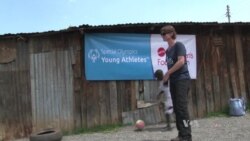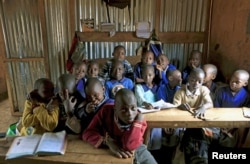Living in a Nairobi slum is not easy. Electricity is scarce, clean water expensive, sanitation poor, and quality education hard to come by.
But for children living with disabilities, slum life becomes even more difficult.
“It’s one thing if you’re a kid with special needs or intellectual disabilities in a developed country. But when you consider kids growing up in a slum in Nairobi, or any other slum in a major urban area in Africa, there’s a huge need there,” said Nancy McNally, regional information officer for East and Southern Africa at Catholic Relief Services.
Many challenges
And according to McNally, these are not their only challenges.
“If they have intellectual disabilities, then sometimes they are ostracized by their own communities, by their own parents. You know, there are some superstitions that the kids might be cursed,” said McNally.
So to help these children, and provide a support system for their parents, Catholic Relief Services and Special Olympics started a Young Athletes program in the Nairobi slum of Kawangware.
The program caters to children with intellectual disabilities between the ages of two and seven who come to an early childhood development center twice a week to participate in activities with other children.
Social workers also conduct home visits, helping parents with emotional encouragement and positive parenting techniques.
At the same time, parents like Justus Edalia are able to get support from other parents dealing with similar issues.
Important, he said, because caring for his son Jason is a round-the-clock responsibility.
“These children need a very lot of care, because you can’t leave these children for an hour maybe for another neighbor, for a neighbor to take care of him, you are the one who is responsible,” said Edalia.
Varied issues
Parents rarely get a break because even schooling is a problem.
Ann Muchiri, a social worker for the Young Athletes program, said many parents here cannot afford what are called “special schools,” those that service children with disabilities.
“Most of them don’t have a school to go to because the special schools are too expensive for them. They cannot afford it, and then again, some schools don’t want these children. So they just stay with them at home,” said Muchiri.
Edalia acknowledged that his involvement in his son’s life is unusual, because most of the children’s caregivers are single mothers whose husbands often leave them.
“Most fathers, don’t like this child with a disability. Most parents, like dad, they see the child with the disability is like an outcast,” said Edalia.
But Edalia, who is actively parenting his son, said the program has helped. “Because right now, he has got a very good improvement,” he said.
There are currently 74 children in the program. Organizers say they hope to expand.










